七年级下册 Unit 2 What time do you go to school Section A 1a-2d 课件(共18张PPT,内嵌音频)
文档属性
| 名称 | 七年级下册 Unit 2 What time do you go to school Section A 1a-2d 课件(共18张PPT,内嵌音频) | 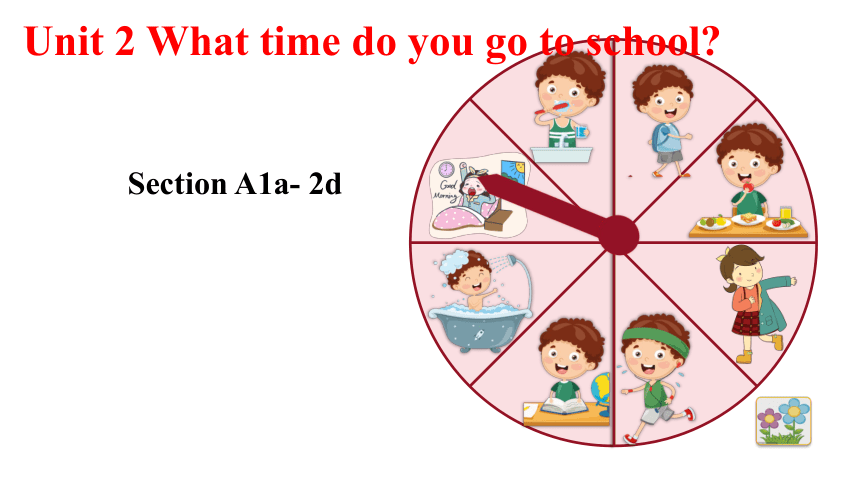 | |
| 格式 | pptx | ||
| 文件大小 | 41.7MB | ||
| 资源类型 | 教案 | ||
| 版本资源 | 人教新目标(Go for it)版 | ||
| 科目 | 英语 | ||
| 更新时间 | 2023-04-25 15:59:51 | ||
图片预览

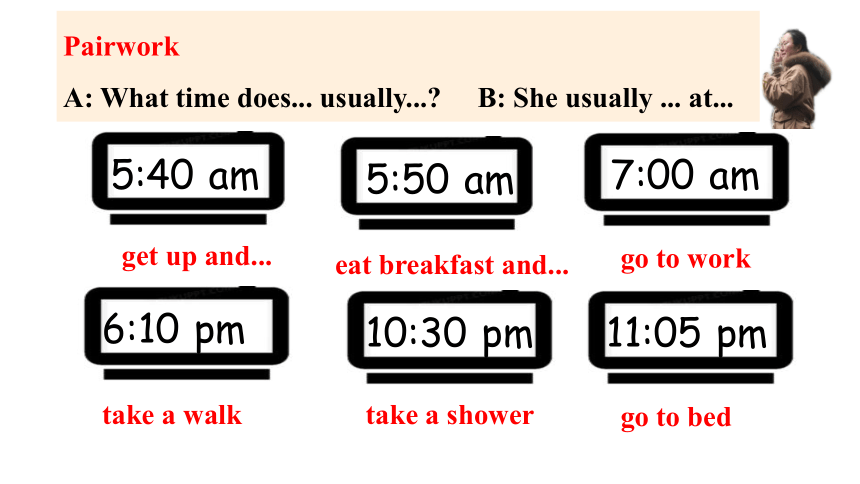
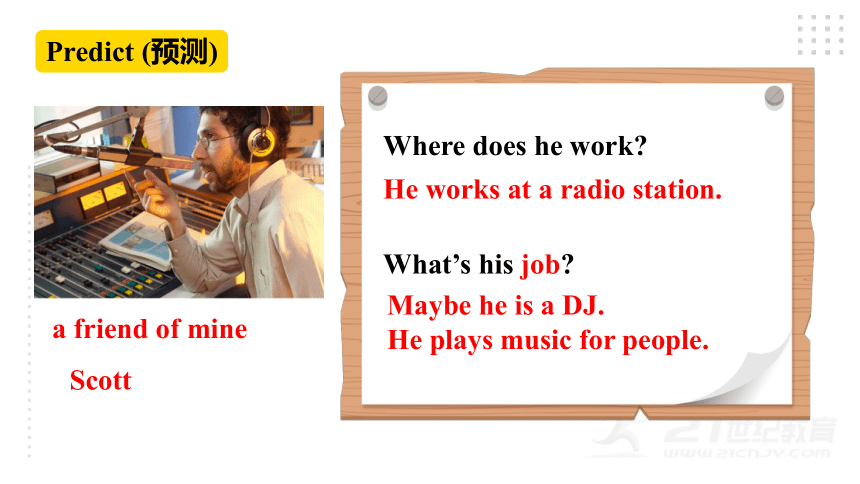
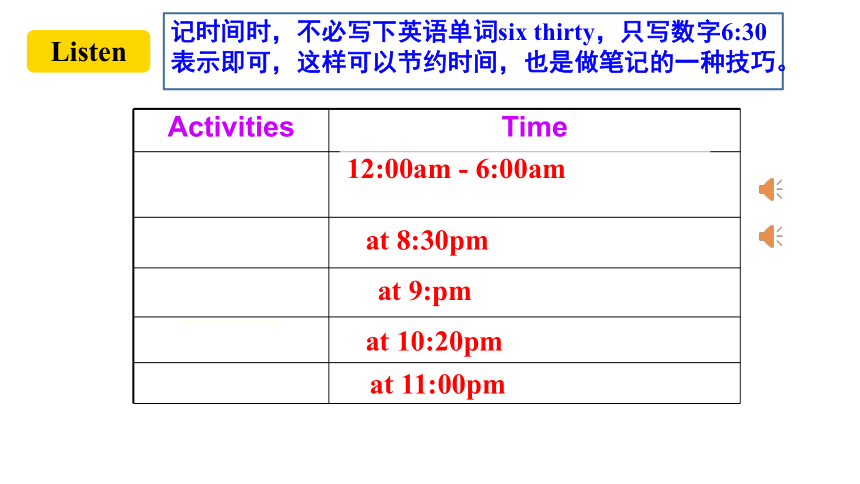
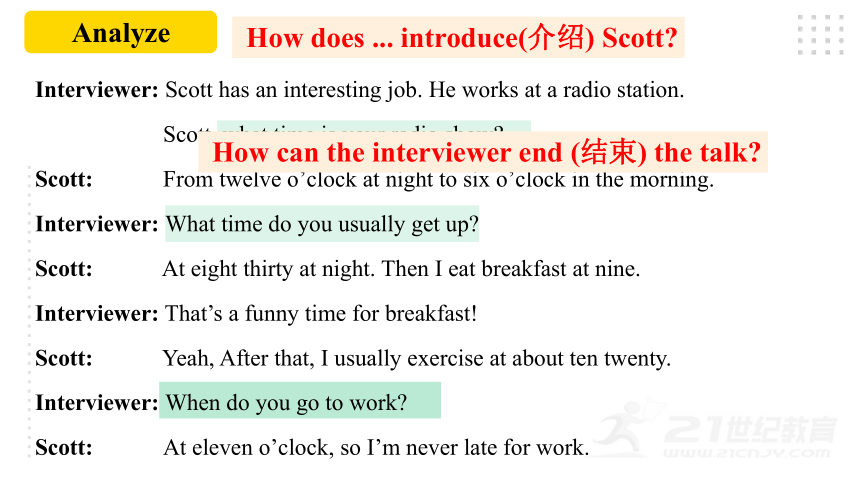
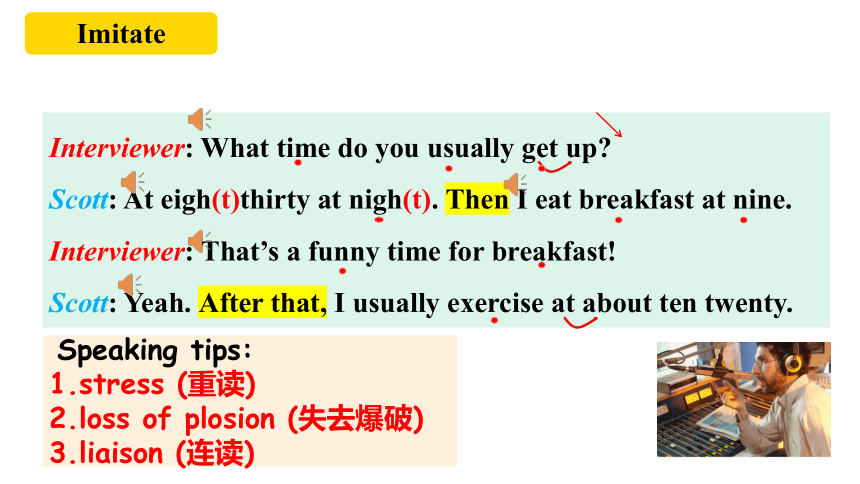
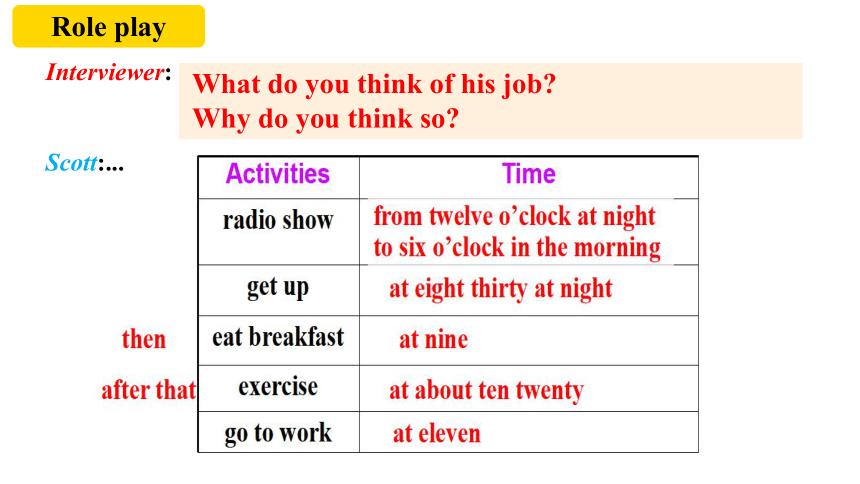
文档简介
(共18张PPT)
Unit 2 What time do you go to school
Section A1a- 2d
5:40 am
5:50 am
6:10 pm
7:00 am
10:30 pm
What time is it
What do I usually do at...
11:05 pm
get up and...
eat breakfast and...
go to work
take a walk
take a shower
go to bed
Pairwork
A: What time does... usually... B: She usually ... at...
Where does he work
What’s his job
He works at a radio station.
Maybe he is a DJ.
He plays music for people.
a friend of mine
Scott
Predict (预测)
Listen and fill in the blanks.
Activities Time
radio show
get up
eat breakfast
exercise
go to work
at 9:pm
at 10:20pm
at 11:00pm
at 8:30pm
12:00am - 6:00am
Listen
记时间时,不必写下英语单词six thirty,只写数字6:30表示即可,这样可以节约时间,也是做笔记的一种技巧。
Interviewer: Scott has an interesting job. He works at a radio station.
Scott, what time is your radio show
Scott: From twelve o’clock at night to six o’clock in the morning.
Interviewer: What time do you usually get up
Scott: At eight thirty at night. Then I eat breakfast at nine.
Interviewer: That’s a funny time for breakfast!
Scott: Yeah, After that, I usually exercise at about ten twenty.
Interviewer: When do you go to work
Scott: At eleven o’clock, so I’m never late for work.
Who are the speakers
How does ... introduce(介绍) Scott
Analyze
How can the interviewer end (结束) the talk
Interviewer: What time do you usually get up
Scott: At eigh(t)thirty at nigh(t). Then I eat breakfast at nine.
Interviewer: That’s a funny time for breakfast!
Scott: Yeah. After that, I usually exercise at about ten twenty.
Imitate
Speaking tips:
1.stress (重读)
2.loss of plosion (失去爆破)
3.liaison (连读)
Interviewer: Scott has an interesting job. He works at a radio station.
Scott, what time is your radio show
Scott:...
Role play
What do you think of his job
Why do you think so
Real play
How about your parents
Activities Time
get up
go to work
eat dinner
exercise
go to bed
A: ...Where does your father/mother work
B:He/ She ...
A: What time does...
B:He/ She ...
Let’s check!
Checklist
I think they can get ________ stars★, because they _________.But they _______.
Items (评价条目) Stars
Structure(内容) Beginning and Ending. ★★
Language (语言) Useful expressions in this class. (activities, time,conjunctions)★★★★★
Strategy (技巧) Stress (重读) . ★
Loss of plosion (语调). ★
Liaison(连读). ★
Level A Imitate 2d.
Level B Role play 2d.
Level C Make up a new converstaion .
【用法详解】job作可数名词,指具体的职业或工作。
She wants to find a job in Shanghai. 她想在上海找一份工作。
【拓展延伸】“Good job!” 常用于口语中,意为“干得好!“,常用来赞扬对方。
—Mom, I finish cleaning my room. 妈妈,我打扫完我的房间了。
—Good job! 干得好!
1. Scott has an interesting job. 斯科特有一份有趣的工作。
Language points
2. He works at a radio station. 他在一家广播电台工作。
【用法详解】(1) work在此作不及物动词,意为“工作”。worker 是名词,意为“工人”。
go to work去工作 work at/in...在...上班 work as a/an...做...的工作
Do you work in a school 你是在学校工作吗?
(2)work还可作不可数名词,意为“工作” ,指人们在日常生活和工作中从事的体力或脑力劳动,即各类工作。at work表示“在工作”。
Please keep quiet. Your father is at work.请保持安静。你爸爸正在工作。
【易混辨析】work与job
两者作名词,都可意为“工作”,但意义有所区别。
work 不可数名词 泛指抽象意义的工作。
job 可数名词 指具体的某种工作或职业。
例如: 鲍勃想找一份好的工作。Bob wants to find a good ____.
今天我有很多工作要做。I have much _____ to do today.
她每天六点钟去上班。She goes to _____ at six o’clock.
她在一个学校教书。______________________________
job
work
work
She works as a teacher in a school.
That’s a funny time for breakfast!那个时候吃早餐很奇怪!
funny为形容词,意为“奇怪的;滑稽的,好笑的”。
注意:①fun可用作形容词,意为“有趣的,使人快乐的”。
②fun还可用作不可数名词,意为“乐趣,快乐”。
例如: 它们是滑稽的猴子。______________________________
The machine is making a very funny noise.
______________________________
那听起来有趣。______________________________
I hope you'll have fun at the party.____________________
They are funny monkeys.
这部机器发出一种很怪的声音。
That sounds fun.
我希望你将在聚会上过得愉快。
That’s a funny time for breakfast!那个时候吃早餐很奇怪!
“...time for sth./...time to do sth.”,表示“……时间做……”。
注意:由time构成的常见句式还有:
①“It's time for.../It's time to do...”“到了该(做)……的时候了”。
②“It's time for sb. to do sth.”“某人该做某事了。”
例如: 我们没有时间锻炼。______________________________
该吃午饭了。______________________________
我们该回家了。______________________________
We have no time for exercise.
It's time for/to have lunch.
It's time for us to go home.
After that, I usually exercise at about ten twenty. 那之后,我通常十点二十左右锻炼身体。
【用法详解】exercise在此处作动词,意为“锻炼”。
My grandparents exercise every day. 我的爷爷奶奶天天锻炼身体。
【拓展延伸】exercise还可作名词,常见用法如下:
exercise n.
不可数名词
可数名词
表示“锻炼;运动”,常和take, do, get等词连用
表示”一套动作“或”练习,习题“,如do morning exercises做早操
【图解助记】exercise的一词多义:
do/take exercise
做运动;锻炼
do eye exercises
做眼保健操
do math exercises
做数学练习题
如: 他爷爷每天早晨锻炼。 His grandpa _________ in the morning.
每天他都做大约十五分钟的运动。
He does about fifteen minutes' _____ every day.
我们每天做早操。We do morning ________ every day.
exercises
exercise
exercises
I’m never late for work.我从不上班迟到。
be late for...……迟到=come to ...late
固定短语be late for...中的late为形容词。同义短语为come to ...late,其中late为副词。
never频度副词,从不;绝不。与always意义相反。通常用于一般现在时,常置于be动词和情态动词之后、实义动词之前。
例如: 你经常上学迟到吗?______________________________
______________________________
他从不喝酒。______________________________
Do you often come to school late
Are you often late for school
He never drinks.
Unit 2 What time do you go to school
Section A1a- 2d
5:40 am
5:50 am
6:10 pm
7:00 am
10:30 pm
What time is it
What do I usually do at...
11:05 pm
get up and...
eat breakfast and...
go to work
take a walk
take a shower
go to bed
Pairwork
A: What time does... usually... B: She usually ... at...
Where does he work
What’s his job
He works at a radio station.
Maybe he is a DJ.
He plays music for people.
a friend of mine
Scott
Predict (预测)
Listen and fill in the blanks.
Activities Time
radio show
get up
eat breakfast
exercise
go to work
at 9:pm
at 10:20pm
at 11:00pm
at 8:30pm
12:00am - 6:00am
Listen
记时间时,不必写下英语单词six thirty,只写数字6:30表示即可,这样可以节约时间,也是做笔记的一种技巧。
Interviewer: Scott has an interesting job. He works at a radio station.
Scott, what time is your radio show
Scott: From twelve o’clock at night to six o’clock in the morning.
Interviewer: What time do you usually get up
Scott: At eight thirty at night. Then I eat breakfast at nine.
Interviewer: That’s a funny time for breakfast!
Scott: Yeah, After that, I usually exercise at about ten twenty.
Interviewer: When do you go to work
Scott: At eleven o’clock, so I’m never late for work.
Who are the speakers
How does ... introduce(介绍) Scott
Analyze
How can the interviewer end (结束) the talk
Interviewer: What time do you usually get up
Scott: At eigh(t)thirty at nigh(t). Then I eat breakfast at nine.
Interviewer: That’s a funny time for breakfast!
Scott: Yeah. After that, I usually exercise at about ten twenty.
Imitate
Speaking tips:
1.stress (重读)
2.loss of plosion (失去爆破)
3.liaison (连读)
Interviewer: Scott has an interesting job. He works at a radio station.
Scott, what time is your radio show
Scott:...
Role play
What do you think of his job
Why do you think so
Real play
How about your parents
Activities Time
get up
go to work
eat dinner
exercise
go to bed
A: ...Where does your father/mother work
B:He/ She ...
A: What time does...
B:He/ She ...
Let’s check!
Checklist
I think they can get ________ stars★, because they _________.But they _______.
Items (评价条目) Stars
Structure(内容) Beginning and Ending. ★★
Language (语言) Useful expressions in this class. (activities, time,conjunctions)★★★★★
Strategy (技巧) Stress (重读) . ★
Loss of plosion (语调). ★
Liaison(连读). ★
Level A Imitate 2d.
Level B Role play 2d.
Level C Make up a new converstaion .
【用法详解】job作可数名词,指具体的职业或工作。
She wants to find a job in Shanghai. 她想在上海找一份工作。
【拓展延伸】“Good job!” 常用于口语中,意为“干得好!“,常用来赞扬对方。
—Mom, I finish cleaning my room. 妈妈,我打扫完我的房间了。
—Good job! 干得好!
1. Scott has an interesting job. 斯科特有一份有趣的工作。
Language points
2. He works at a radio station. 他在一家广播电台工作。
【用法详解】(1) work在此作不及物动词,意为“工作”。worker 是名词,意为“工人”。
go to work去工作 work at/in...在...上班 work as a/an...做...的工作
Do you work in a school 你是在学校工作吗?
(2)work还可作不可数名词,意为“工作” ,指人们在日常生活和工作中从事的体力或脑力劳动,即各类工作。at work表示“在工作”。
Please keep quiet. Your father is at work.请保持安静。你爸爸正在工作。
【易混辨析】work与job
两者作名词,都可意为“工作”,但意义有所区别。
work 不可数名词 泛指抽象意义的工作。
job 可数名词 指具体的某种工作或职业。
例如: 鲍勃想找一份好的工作。Bob wants to find a good ____.
今天我有很多工作要做。I have much _____ to do today.
她每天六点钟去上班。She goes to _____ at six o’clock.
她在一个学校教书。______________________________
job
work
work
She works as a teacher in a school.
That’s a funny time for breakfast!那个时候吃早餐很奇怪!
funny为形容词,意为“奇怪的;滑稽的,好笑的”。
注意:①fun可用作形容词,意为“有趣的,使人快乐的”。
②fun还可用作不可数名词,意为“乐趣,快乐”。
例如: 它们是滑稽的猴子。______________________________
The machine is making a very funny noise.
______________________________
那听起来有趣。______________________________
I hope you'll have fun at the party.____________________
They are funny monkeys.
这部机器发出一种很怪的声音。
That sounds fun.
我希望你将在聚会上过得愉快。
That’s a funny time for breakfast!那个时候吃早餐很奇怪!
“...time for sth./...time to do sth.”,表示“……时间做……”。
注意:由time构成的常见句式还有:
①“It's time for.../It's time to do...”“到了该(做)……的时候了”。
②“It's time for sb. to do sth.”“某人该做某事了。”
例如: 我们没有时间锻炼。______________________________
该吃午饭了。______________________________
我们该回家了。______________________________
We have no time for exercise.
It's time for/to have lunch.
It's time for us to go home.
After that, I usually exercise at about ten twenty. 那之后,我通常十点二十左右锻炼身体。
【用法详解】exercise在此处作动词,意为“锻炼”。
My grandparents exercise every day. 我的爷爷奶奶天天锻炼身体。
【拓展延伸】exercise还可作名词,常见用法如下:
exercise n.
不可数名词
可数名词
表示“锻炼;运动”,常和take, do, get等词连用
表示”一套动作“或”练习,习题“,如do morning exercises做早操
【图解助记】exercise的一词多义:
do/take exercise
做运动;锻炼
do eye exercises
做眼保健操
do math exercises
做数学练习题
如: 他爷爷每天早晨锻炼。 His grandpa _________ in the morning.
每天他都做大约十五分钟的运动。
He does about fifteen minutes' _____ every day.
我们每天做早操。We do morning ________ every day.
exercises
exercise
exercises
I’m never late for work.我从不上班迟到。
be late for...……迟到=come to ...late
固定短语be late for...中的late为形容词。同义短语为come to ...late,其中late为副词。
never频度副词,从不;绝不。与always意义相反。通常用于一般现在时,常置于be动词和情态动词之后、实义动词之前。
例如: 你经常上学迟到吗?______________________________
______________________________
他从不喝酒。______________________________
Do you often come to school late
Are you often late for school
He never drinks.
同课章节目录
- Unit 1 Can you play the guitar?
- Section A
- Section B
- Unit 2 What time do you go to school?
- Section A
- Section B
- Unit 3 How do you get to school?
- Section A
- Section B
- Unit 4 Don't eat in class.
- Section A
- Section B
- Unit 5 Why do you like pandas?
- Section A
- Section B
- Unit 6 I'm watching TV.
- Section A
- Section B
- Review of Units 1-6
- Unit 7 It's raining!
- Section A
- Section B
- Unit 8 Is there a post office near here?
- Section A
- Section B
- Unit 9 What does he look like?
- Section A
- Section B
- Unit 10 I'd like some noodles.
- Section A
- Section B
- Unit 11 How was your school trip?
- Section A
- Section B
- Unit 12 What did you do last weekend?
- Section A
- Section B
